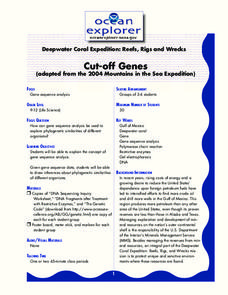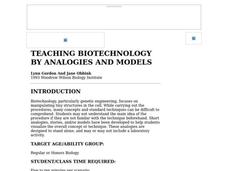Curated OER
Polymerase Chain Reaction (PCR)
Students explore how PCR works through various activities. In this biology lesson, students explain how PCR generate copies of DNA. They simulate the process using an online interactive website.
Curated OER
Polymerase Chain Reaction Activity
Students explain the importance and function of enzymes. They compare and contrast the processes of DNA replication and polymerase chain reactions. They practice using new vocabulary as well.
Curated OER
Polymerase Chain Reaction and DNA Profiling
Students examine DNA fingerprinting and polymerase chain reaction and how they are used in everyday life and for criminal investigations. They discover how these techniques can also be used to answer ecological and evolutionary questions.
Curated OER
Who Is It?/Who Done It?
Students conduct an experiment that allows them to assess individual differences in random DNA sequences and apply those differences when solving a forensic problem. After discussing the polymerase chain reaction and its use to identify...
Curated OER
Cut-off Genes
Investigate the relationships between different deep-sea organisms by DNA sequencing. A worksheet provides instructions for DNA sequencing and space to work. They simulate gel electrophoresis by cutting out paper "DNA strands."...
Curated OER
How Do We Generate a Large Amount of a Specific DNA Sample?
Learners investigate the Polymerase Chain Reaction technique that is used to create larger amounts of a gene. They watch and discuss a PowerPoint presentation, explore a website, and write a report listing the materials needed to...
Curated OER
Module 1, Unit 2, Lesson Plan 2: PCR and DNA Diagnosis
Students discuss the importance of the Polymerase Chain Reaction for biologists. They explain what factors make the Polymerase Chain Reaction possible. Students explain the steps in thermocycling and what happens during each step.
Curated OER
Doggy DNA: The Power of PCR
Students listen as the teacher lectures about Polymerase Chain Reaction, and the technical information about its uses. They collect dog saliva and run/analyze a gel electrophoresis. Students use a computer to integrate information, and...
Curated OER
Invent PCR: You May Win a Nobel Prize
Students gain an appreciation for the simplicity, but also complexity and elegance of PCR. They comprehend all components of the protocol. Students explain exactly how CPR works, and why, after the third cycle, the predominant DNA being...
Curated OER
The Arizona Hedgehog Cactus: Endangered Species or not?: Biology, Plants
In this lesson students will study the: "Classification of Echinocereus triglochidiatus and Geographical Ranges of its Varieties." Students read background material and scientific literature to analyze the cactus populations and then...
Curated OER
Infectious Disease Case Study
Students list the steps an epidemiologist takes to detect a pathogen. They role-play as scientists as they investigate the cause of the outbreak in Japan during 1996.
Curated OER
West Nile Virus Strikes Again
Students examine the West Nile virus and how it is impacting an American Indian reservation, In this virus lesson students devise a prevention plan for an Indian reservation to help limit the transfer of the West Nile virus.
Curated OER
Cutt-Off Genes
Students explore how gene sequence analysis can be used to examine phylogenetic similarities of different organisms. Students work in groups to simulate a gel electrophoresis separation of fragments using poster board to create their gel.
Curated OER
Cut-Off Genes
Students explain the concept of gene sequence analysis. In this gene lesson, students draw inferences about phylogenetic similarities of different organisms.
Curated OER
Teaching Biotechnology By Analogies And Models
Students explore biotechnology by analogies and models. They read several provided scenarios and answer questions to discover some basic concepts of biotechnology.
Curated OER
Determination of Phylogenetic Relationships Using Restriction Analysis
Young scholars applied various mathematical analyses to interpret their data. By using the resulting DNA fragment patterns from several enzymes students established a possible evolutionary relationship among the mice.
Curated OER
Teaching Biotechnology by Analogies and Models
Students examine analogies and create models to help visualize the concept and technique of basic biotechnology. Common scenarios are used to explain the complex procedures of genetic engineering.
Curated OER
DNA Race Track
Twelfth graders simulate a DNA fragment running through a gel electrophoresis in a class activity. Students work in teams as a DNA sample with each person on the team representing a fragment that moves through the gel at a specific speed.
Alabama Learning Exchange
Alex: "Dummie's" Guide to Pcr
(This lesson is for a more advanced class such as honors or AP Biology.) The lesson will look at one of the most important tools to the molecular biologist, PCR (Polymerase Chain Reaction). The young scholars will learn the science...




















